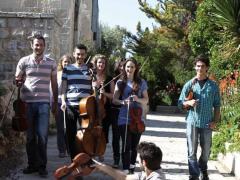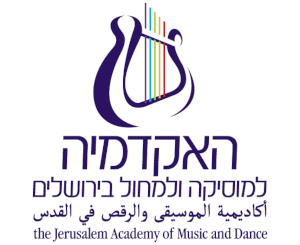
Conductors | Dirigenten: David Afkham, Karin Ben-Josef
Soloists | Solisten: Dragos Mânza, Roi Shiloah
• Johannes Brahms: Sinfonie Nr. 1 c-Moll und Tragische Ouvertüre d-Moll
• Karl Amadeus Hartmann: Concerto funebre – Violinkonzert
• Carl Goldmark: Violinkonzert a-Moll
• Viktor Ullmann/Michael Wolpe: 7. Klaviersonate, 5. Satz „Thema, Variationen und Fuge über ein hebräisches Volkslied“, in einer Orchesterfassung von Michael Wolpe
Concerts:
• 17. August 2011, 19:30 Uhr:
Gesprächskonzert –Dorint Am Goethepark Weimar
An diesem Abend erhalten Sie eine erste musikalische Kostprobe des neugegründeten Orchesters und können die Musiker in lockerer Atmosphäre bei einem Glas Wein persönlich kennenlernen.
• 19. August 2011, 18:30 Uhr:
„Gedächtnis Buchenwald“,
Eröffnungskonzert Kunstfest Weimar „pèlerinage“ – ccn weimarhalle, Weimar
• 20. August 2011, 20:00 Uhr:
Konzert auf der Wartburg – Eisenach
• 22. August 2011, 19:00 Uhr:
Konzert in der Französischen Friedrichstadtkirche – Berlin
Work phase in Israel: December 22—29, 2011
More Concerts:
• 'Tslilim BaMidbar' Festival in Sde-Boker; Sunday Dec. 25th 2011 at 20:30
• YMCA hall in Jerusalem; Tuesday Dec. 27th 2011 at 20:30. amongst esteemed attendants will be the Prime-Minister of Turingia and both the Israeli and German minister of education.
• Merkaz Einav in Tel-Aviv; Wednesday Dec. 28th 2011 at 20:30
Both Jerusalem And Tel-Aviv Concert Are Free Of Admittance
Young musicians from Israel and Germany, Weimar and Jerusalem, students of the Jerusalem Academy of Music and Dance and The Liszt School of Music Weimar, along with students from their associated high schools for highly talented young musicians, meet each other. They play together in one orchestra. They rehearse, give concerts,discuss and celebrate together.
The history that unites them and divides them, comes to life again in the viewpoint of the other. Weimar is both a location of the human spirit and also of the latter’s negation. From classicism to Bauhaus and Buchenwald, both the hopeful points of light and the tragic errors of European history become visible in one narrow space. Precisely here, a young generation that has experienced witness to history only in a mediated form may begin a new discussion and understanding of past and present. In a concrete and personal way. This happens with the help of music. For music makes human encounter possible. Music encourages attentive listening, intuitive understanding and thoughtful discussion. It creates community and makes, especially through the experience of concerts, human contact experienceable through its radical presentness.

